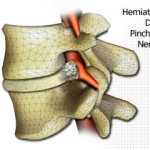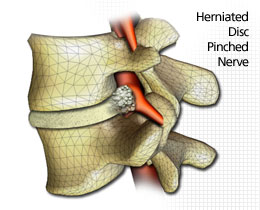 Life is Great! As long as you have the strength and energy to undertake all the challenges that life places on your shoulders and spine. Eighty percent (80%) of the population will suffer from crippling lower back pain at some time in their life. So it is expected that some people will suffer an uncomplicated episode and other a much more complicated scenario is taking place, such as a slipped disc.
Life is Great! As long as you have the strength and energy to undertake all the challenges that life places on your shoulders and spine. Eighty percent (80%) of the population will suffer from crippling lower back pain at some time in their life. So it is expected that some people will suffer an uncomplicated episode and other a much more complicated scenario is taking place, such as a slipped disc.
Back pains come from inflamed soft tissues such as muscles, ligaments, cartilage, tendons, nerves and intervertebral discs. When tissues are inflamed they swell causing pressure that causes pain. When the spine has a long-standing misalignment, the disc at that level malfunctions and deteriorates at an accelerated rate, resulting in disc pathology; eventually the disc can bulge, herniate or rupture.
Slipped discs can happen anywhere in the spine but most commonly at the bottom of the spine, at the 4th lumbar and 5th lumbar levels; secondly in the mid neck area at the 5th cervical and 6th cervical levels; least of all in the mid or thoracic part of the spine. The common feature of an advanced disc problem is pain and often radiating pain when it presses on the nerve that leaves the spine at that level. Reoccurring spinal pain is a serious warning of a spinal misalignment.
Solutions are as follows:
- Advanced slipped discs may likely need surgery when the pressure on the nearby nerves and spinal cord cause loss of bladder function and muscle paralysis.
- Advancing disc problems respond best to Chiropractic care when specialized protocols called “flexion-distraction” are used along with regular Chiropractic spinal care procedures.
- Uncomplicated disc problems may benefit from Physical Therapy, traction, etc. when correctly diagnosed.
- Simple disc concerns are mainly spinal misalignment concerns and these are best managed by a Doctor of Chiropractic. The procedure is to examine and determine what levels of the spine have misaligned and undergo a course of spinal corrective care, even before they cause a lot of pain. In these situations the discs never progress to any advanced stages. This falls in the “prevention is worth a pound of cure” category when it comes to slipped discs.
If you suspect that you or someone you know has a slipped disc, the first and smart thing to do is to ask your friends or look online for a Chiropractic clinic near your home or work and set an appointment for a proper spinal evaluation that normally includes specialized x-rays. You’ll be glad you did!
If you have specific questions and they are not too personal to log online, post your question below. My reply will help you with your concerns and others who may be too shy to ask. 😉
Yours in Health,
docMIKE


 Follow
Follow
6 Comments
Elvira
03/29/2013 at 2:02 pmHello there, just became aware of your blog through Google, and found that it really gave me clarity on this problem of lower back pains.
acekard 2i
04/02/2013 at 12:47 pmVery informative article post.Really thank you! Will read on
Jami
05/08/2013 at 4:57 amHelpful info. Fortunate me I found your website by chance, and I am
stunned why this twist of fate didn’t happened earlier! I bookmarked it.
alarmeringen
05/14/2013 at 5:24 amI wanna say thanks for publicing this good information. Keep up the good work. I’ll subscribe to your blog also. Thanks!
Glory Stratton
05/24/2013 at 6:23 pmI personally was basically exploring for plans for my blog site and stumbled upon your own blog, “Spinal Discs (back/neck pains with leg/arm pain) | docMIKE’s Blog”, do you mind if perhaps I personally utilize some of ur points? Many thanks -Carla
Cyrus Dupree
05/31/2013 at 10:44 pmThanks for sharing your thoughts on spinal discs.
Regards